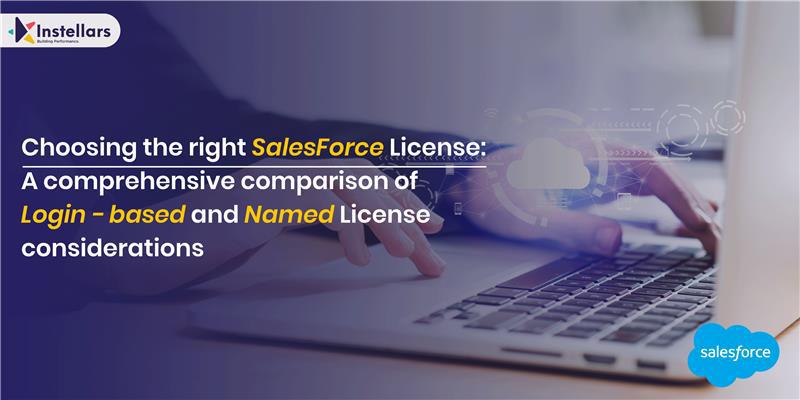
Choosing the right Salesforce License: A comprehensive comparison of Login-based and Named License considerations

Salesforce offers various licenses to cater to the diverse needs of
businesses. When it comes to licensing, two common options are login-based
licenses and named licenses. Understanding the differences and benefits of
these license types is crucial for organizations looking to leverage Salesforce
to its full potential. There are several factors that affect the License
considerations for organizations.
Factors affecting license considerations:
1.
User Usage Patterns:
Evaluate how users will interact with Salesforce. If
you have many occasional or infrequent users who only need access to Salesforce
periodically, such as for data entry or reporting purposes, login-based
licenses may be more suitable. On the other hand, if users require frequent and
consistent access to Salesforce for their daily tasks, named licenses may be a
better choice.
2. User Accountability and Security:
Consider the need for user accountability and security.
Named licenses provide a higher level of accountability as each user has a
unique login and user profile. This allows for more granular control over user
permissions and data access. If user tracking and auditing are important for
compliance or security reasons, named licenses are preferred.
3.
Cost Considerations:
Evaluate the cost implications of each license type. Login-based licenses are typically more cost-effective for organizations with many occasional users since they only pay for the active logins during a given period. Named licenses, on the other hand, have a fixed cost per user regardless of usage frequency. Consider your user base and usage patterns to determine which option aligns better with your budget.
4.
User Experience and Personalization:
Consider the user experience and personalization
requirements. Named licenses provide users with a consistent profile,
preferences, and personalized settings, enhancing their overall experience. If
users require customization options, personalized dashboards, or access to
advanced features, named licenses would be more appropriate.
5.
Integration and External User Access:
Evaluate any integration needs or the requirement to
provide access to external users. Login-based licenses may be more suitable for
integrations with external systems or granting limited access to external
stakeholders who don't require the full functionality of named licenses.
6.
Administrative Overhead:
Assess the administrative overhead associated with each license type. Named licenses require user management tasks such as provisioning, deactivating, and maintaining user profiles. If you have a large user base with frequent changes, this administrative overhead can be significant. Login-based licenses, in comparison, require less administrative effort since the focus is on managing the number of active logins.
Carefully
consider these factors in the context of your organization's specific needs,
user profiles, and budget constraints. It's also recommended to consult with
Salesforce account executives or consultants who can provide detailed insights
and guidance based on your specific requirements.
Some examples for
Login-based and Named license considerations
Login-Based
License Example
Suppose you work
for a company that conducts an annual customer satisfaction survey. During this
survey period, you need to provide access to many employees across different
departments to enter survey responses into Salesforce. However, these employees
are not regular Salesforce users and only require access for a limited time.
In this case, using login-based licenses would be appropriate. Instead of
purchasing named licenses for each employee, you can acquire a set of
login-based licenses that allow a specific number of concurrent logins. You can
allocate these licenses to the employees involved in the survey, and until the
number of active logins does not exceed the purchased license limit, users can
access Salesforce and enter survey responses.
After the survey
period ends, the login-based licenses can be deactivated, and you would only
pay for the licenses utilized during that specific time frame. This approach
helps optimize costs by avoiding the need for named licenses for temporary
users who have sporadic Salesforce access.
It's important to
note that login-based licenses are best suited for users with minimal or
occasional interaction with Salesforce, where user accountability and granular
access control are not critical factors. Assess your user usage patterns and
the specific requirements of your organization to determine if login-based
licenses align with your use case.
Named License
Example
Let's
say you work for a sales team in a company that heavily relies on Salesforce
for their day-to-day activities. The sales representatives need constant access
to Salesforce to manage leads, contacts, opportunities, and track their sales
pipeline. In this scenario, using named licenses would be appropriate. Each
sales representative would have their own unique login and user profile with
personalized settings, permissions, and reporting capabilities. Named licenses
provide a consistent and personalized user experience, allowing each sales
representative to access Salesforce regularly and utilize its full
functionality.
Licenses that support login-based access in Salesforce
Salesforce
Platform Login
This license
provides login access to Salesforce and basic CRM functionality. It allows
users to log in to Salesforce and perform standard tasks like accessing and
modifying data, collaborating with other users, and utilizing basic Salesforce
features.
Customer Community Login
This
license is designed for external users who need access to a Salesforce
community. Users with Customer Community Login licenses can log in to the
community and engage in activities such as accessing knowledge articles,
participating in discussions, submitting cases, and interacting with
community-specific features.
Partner Community
Login
Similar to Customer Community Login, Partner Community Login licenses are
intended for users outside your organization, such as partners, resellers, or
distributors. These users can log in to a Salesforce partner community and
collaborate with your organization, access shared resources, and manage
partner-related activities.
External
Identity User
This license
allows external users to authenticate and log in to Salesforce using external
identity providers such as social media logins or corporate single sign-on
(SSO). External Identity User licenses enable users to access designated
Salesforce functionality and data through their authenticated identity.
The availability of login-based licenses may vary depending on the
specific Salesforce edition and licensing agreements. Always consult with
Salesforce representatives or refer to the official Salesforce documentation to
understand the licensing options and details specific to your organization.
Conclusion
Choosing the right
license type for your Salesforce implementation is a critical decision that can
impact user experience, security, and overall efficiency. Understanding the
differences and benefits of login-based and named licenses is crucial to
maximize the potential of Salesforce and ensure a seamless user experience. So,
take the time to evaluate your organization's requirements and make an informed
decision when it comes to licensing in Salesforce.
To learn more about Salesforce licensing options and how they can benefit your business, contact our experts at Instellars.
Blog Written by:
Naveen
Kumar M
Salesforce Practice
Head
The transformation that matters
Send your resume to Careers @ Instellars
